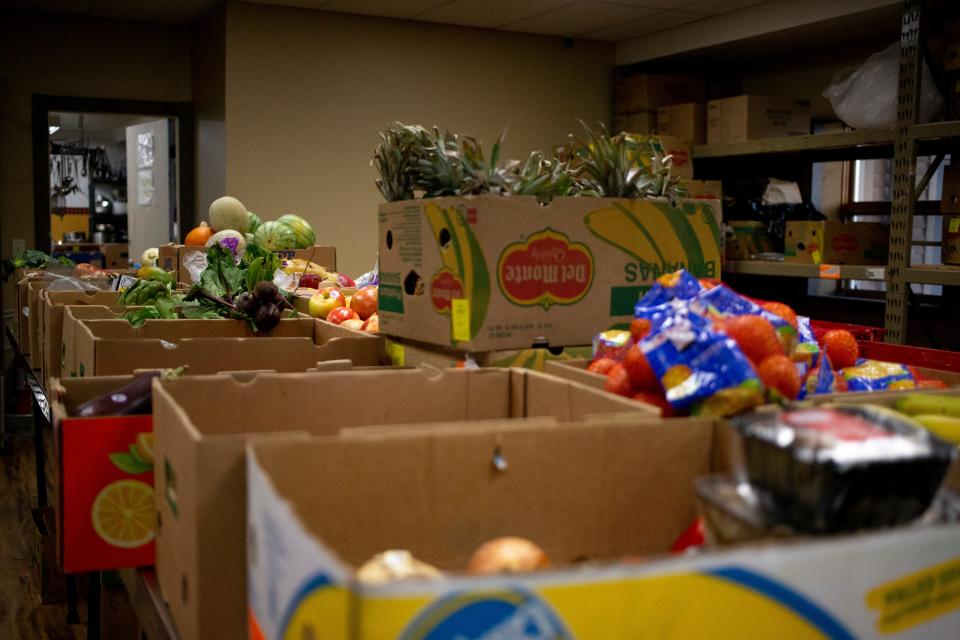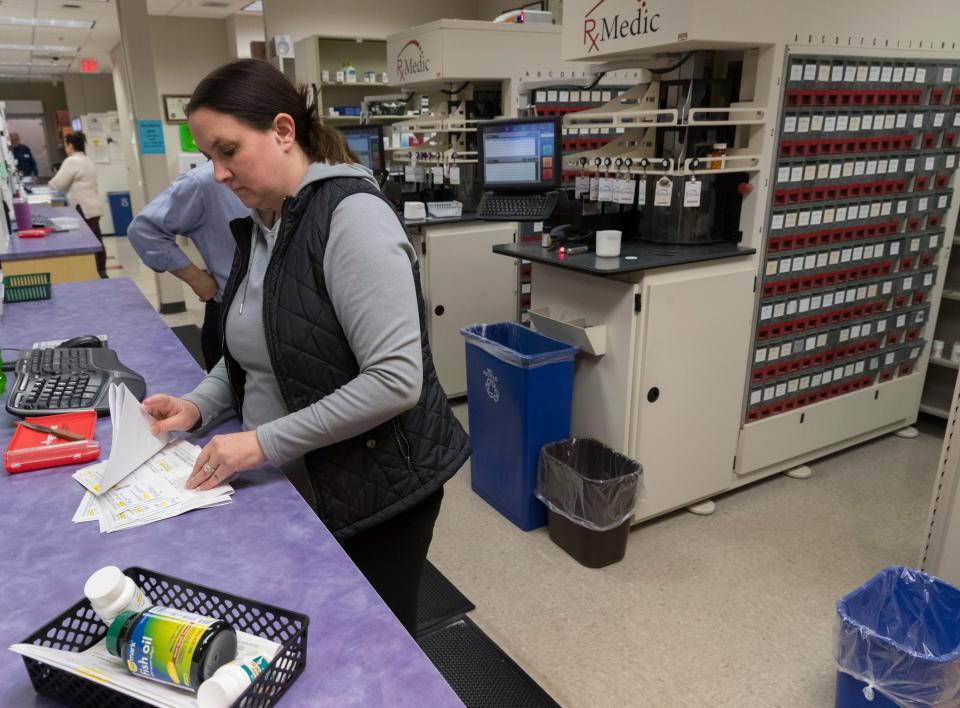Here's how a potential government shutdown could affect Green Bay
With the gridlock in Washington continuing, a federal government shutdown looks more and more likely by the day.
Most of the fight has been taking place in the House of Representatives, where Republican lawmakers are split on whether to debate individual spending bills or buy the government more time to completely fund itself.
If Congress doesn't pass a spending bill by 12:01 a.m. Oct. 1, the federal government will shut down. All federal agencies except those that are "essential" — including U.S. Postal Service, Medicare and Social Security — will stop work. The effects depend on how long the shutdown lasts and the contingency plans each agency has.
The last time Congress failed to pass a government spending bill, nearly a million Americans were furloughed or went without pay, President Joe Biden wrote on X, formerly Twitter. The shutdown, which lasted 35 days from December 2018 to January 2019, impacted local Indigenous tribes, domestic abuse agencies, members of the Coast Guard and many more.
So how would a government shutdown affect Green Bay and surrounding communities?
Will I still receive mail during the government shutdown?
Yes. The U.S. Postal Service “does not cease operations during any federal lapse in appropriations as it is funded through a permanent no-year appropriation,” according to its 2024 fiscal year shutdown plan. This means you will still receive mail during the shutdown.
The Postal Service doesn't rely on taxpayer dollars because it generally gets its funding through the sales of products and services.

Will I still be able to travel by air and get my passport?
Air traffic controllers and TSA screeners are deemed essential workers — however, they won’t be paid until the shutdown ends, and TSA lines could grow longer if enough screeners stay home.
Transportation Secretary Pete Buttigieg said Wednesday that air travel will remain safe in a shutdown, but that the training of new air traffic controllers will stop and 1,000 trainees will be furloughed.
And, while passport processing would still continue “as long as there are sufficient fees to support operations,” according to State Department guidance, passport work could stop if the building where the work is done gets shuttered.
Will the government still service student loans?
The Education Department would be forced to furlough about 90% of its staff, according to a 2021 blueprint.
Shutdown or not, borrowers’ payments will still be due. For the most part, loan servicers will be able to continue to process payments regularly — but there could be delays for those who need to consult with or seek help from the Education Department due to the potential of agency furloughs.
Students applying for federal aid during a shutdown can expect similar delays because of this. Officials have pointed to potential disruptions to processing FAFSA applications, disbursing Pell Grants and pursuing public loan forgiveness, for example.

How will the shutdown affect child care and school meals?
Although K-12 and higher education policy is largely handled at the state and local level, a potential shutdown could significantly impact families, especially when it comes to federally supported child-care services.
“As workers go without pay, families go without child care, poor families lose support for housing and food, and schools feel the squeeze,” said David R. Schuler, executive director of American Association of School Administrators, in a statement Friday urging lawmakers to keep the government open.
One of the programs that would be endangered right away is Head Start, which serves low-income families nationwide, According to the White House, 10,000 children in Alabama, Connecticut, Florida, Georgia, Massachusetts and South Carolina would immediately lose access to it, as the Department of Health and Human Services would be unable to award federal grants to child-care centers.
Tommy Sheridan, the deputy director for the National Head Start Association, said these programs are in trouble because their grants start on Oct. 1. Programs with grants that don’t start on that date will continue getting money. But if the shutdown drags on, the number of affected programs will grow as more grants come up for renewal.
Schools would continue getting free meals because funding for these programs is permanent and mandatory. Without appropriations, they'd be able to continue through October and potentially a few months beyond that, but not for the entire school year.
Will federal workers get paid during the shutdown?
Many of America's 3.5 million federal workers, including active duty military, would go without pay during the shutdown, according to NBC. Federal law enforcement will also be among those impacted.
During the last shutdown in late 2018 and early 2019, for example, members of the Coast Guard in Door County went without pay for over a month, forcing them and their families to rely upon short-term charitable loans to meet their basic needs.
Because the Department of Justice's Office of Justice Programs and Office on Violence Against Women had closed during that shutdown, the potential lack of funding also jeopardized domestic abuse agencies across the country, including one in Green Bay.
Will I continue to receive Social Security checks?
Regardless of what happens in Washington this weekend, Social Security and Supplemental Security Income recipients will continue to receive payments. But response times for people with issues could be delayed due to furloughs.
According to a recent contingency plan from the Social Security Administration, the agency will cease non-critical actions and those "not directly related to the accurate and timely payment of benefits.” The agency will also continue to issue new social security cards and replacements.

Will SNAP and WIC be affected during the shutdown?
The Supplemental Nutrition Assistance Program, or SNAP, which provides food benefits to millions of low-income families, would continue throughout the month of October, said U.S. Department of Agriculture Secretary Tom Vilsack during a White House briefing Monday. But if the shutdown drags on longer than October, SNAP funding would be put at risk.
In more immediate danger would be the 7 million moms and children relying on the Special Supplemental Nutrition Program for Women, Infants, and Children, or WIC. That program, according to USDA, helps low-income mothers with infants and children at nutritional risk by offering easier access to things like food and healthcare referrals. Their benefits would dry up within a matter of days, Vilsack said, though some states might be able to use extra funding to stave off the effects for a week or two.
During the last government shutdown four years ago, the government nearly ran out of SNAP funding that would’ve affected some 40 million Americans.
How will the shutdown affect farmers and agriculture?
The shutdown will cause farmers to wait on subsidy payments, loans and data they need now to make plans for the spring and future growing seasons. This is because USDA Farm Service Agency offices, which process farm loans and gather data farmers need to make decisions, would be closed.
Similar to previous shutdowns, marketing loans for many farmers would enter into a state of limbo as Farm Service Agency offices in most U.S. counties shutter. More broadly, USDA-backed housing loans for rural families would cease as well.

How will the shutdown impact Wisconsin's Native American tribes?
Many tribes are dependent on federal programs to provide a number of services. During the last government shutdown, Wisconsin tribes had to use their own funds to continue to provide education, health, law enforcement, food pantries and other services.
At the time of the last shutdown, about 1.9 million American Indians and Alaska Natives received basic services from the Department of Interior's Bureau of Indian Affairs, which furloughed over half of its employees.
Contributing: AP; Claire Reid, Milwaukee Journal-Sentinel; Savannah Kuchar, Ken Tran, David Jackson, USA TODAY.
Rebecca Loroff is a breaking and trending news reporter for northeastern Wisconsin. Contact her with story tips and feedback at rloroff@gannett.com.
This article originally appeared on Appleton Post-Crescent: Government shutdown could have ripple effects in Green Bay

